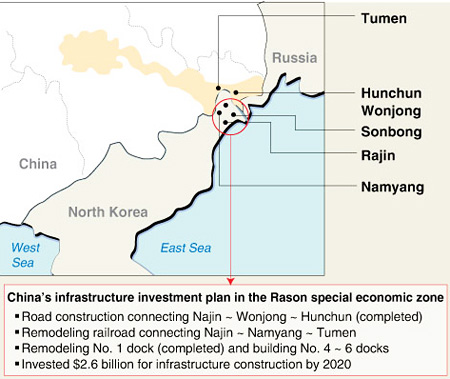China-NK economic ties benefit S. Korea
MANILA –– Growing economic cooperation between China and North Korea could lead to the latter’s economic reform and eventual opening up of its economy to the outside world, experts said.
“(South Korea) doesn’t have to look at the strengthening economic relationship between Beijing and Pyongyang only as a threat since China is doing something South Korea cannot do. It is pushing North Korea to opening up its economy,” said Kwon Young-kyong, a professor at the state-run Education Center for Unification, during an interview with The Korea Times, Tuesday. “The joint economic zones are becoming similar to that of special economic zones in China.”
Won Dong-wook, a professor at Dong-A University, echoed Kwon’s remarks: “China is trying to implement its style of economic reform in North Korea,” said Won. “It is utilizing economic benefits rather than political pressure to push for change.”
The view comes amid continuing concern that Pyongyang’s increasing economic reliance on its main ally may hurt Seoul’s leverage with North Korea, which later may be “absorbed” to China’s sizzling economic expansion.
Beijing’s change in tack to influence its neighbor came after the second nuclear test in 2009 by Pyongyang. Unlike previous forms of economic cooperation, China started to adopt an economic engagement policy or its version of the “Sunshine Policy” led by the central government.
“The new policy was also in line with Pyongyang’s interest as it faced more international sanctions over its nuclear program,” said Kwon.
In June 2011, a ground-breaking ceremony was held for the North Korea-China joint development and operation projects in Rason (Rajin-Sonbong) special economic zone, situated close to the eastern end of their border near Russia, and in Hwanggeumpyeong Island, located on their western border. Following the ceremony, Chinese state-run and private companies invested about $2.6 billion in infrastructure such as roads, docks and railroad to lay the groundwork for future investment.
“After the death of Kim Jong-il the North revised its laws related to foreign economic policy upon the request of China,” said Kwon. “It was unimaginable in the past. Kim Jung-un had to consider the livelihood of the people as polarization kept deepening.”
After the revision of the Law on the Rason Economic Trade Zone, foreign investors were allowed to sell products manufactured in the special economic zone in other areas of North Korea. Experts believe it will help revitalize the impoverished country’s economy by supplying manufactured goods to the market.
Products manufactured in Gaeseong Industrial Complex, to the contrary, are not allowed to be sold in other parts of the North.
According to Kwon, Pyongyang opened an operations office for Rason in China’s Jilin Province to attract more investment.
“China, instead of forcing North Korea to change, is indirectly obligating it to make economic reforms through the joint development schemes,” Kwon said.
In accordance with the tone, Beijing also signed a memorandum of understanding with Pyongyang on recruiting 100,000 North Korean laborers annually to work in border regions of China.
Experts claim North Korea’s leadership led by Kim Jong-un will have to follow the economic cooperation suggested by Beijing as it needs external aid to deal with the growing economic pressure from the inside.
Despite all the advantages, experts argue the economic transformation in North Korea is still a double-edged sword for South Korea in the long-term.
“Portraying the situation in a negative light, Gaeseong Industrial Complex could lose ground, and the North Korean economy become subordinate to that of China,” said Kwon.
While North Korea’s total trade volume in 2011 increased over 60 percent year-on-year to $6.3 billion, 89.1 percent of this was with China, according to Korea Trade-Investment Promotion Agency (KOTRA).
The professor said over 90 percent of North Korea’s exports to China are primary commodities such as raw materials, agricultural and fishery products, a factor that could lead to the collapse of North Korea’s manufacturing sector in the near future.
“The trend may also restrain the two Koreas from having complementary economic cooperation after achieving unification,” Won said.
As for the solution, experts pointed out a multilateral approach to the issue.
“Acknowledging positive aspects of China’s economic ties with the North, other players in Northeast Asia such as South Korea and Russia should join the development projects in those economic zones,” Kwon said. “Above all, searching for joint tasks between Seoul and Beijing in opening up Pyongyang is a priority.”
“As a bordering nation of North Korea, Russia also has economic and security interests linked to the area,” said Won. “Getting more and more regional players involved in the project can reduce negative possible side effects of China-North Korea economic cooperation.”
Both experts participated in the 13th World Korean Forum held in Manila, Philippine. The annual forum was organized by the Korean Global Foundation, a Seoul-based think tank, under the theme of “New Asia for Peace and Prosperity and Korean Reunification.” <The Korea Times/Chung Min-uck>






















































